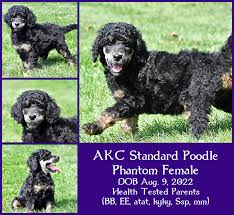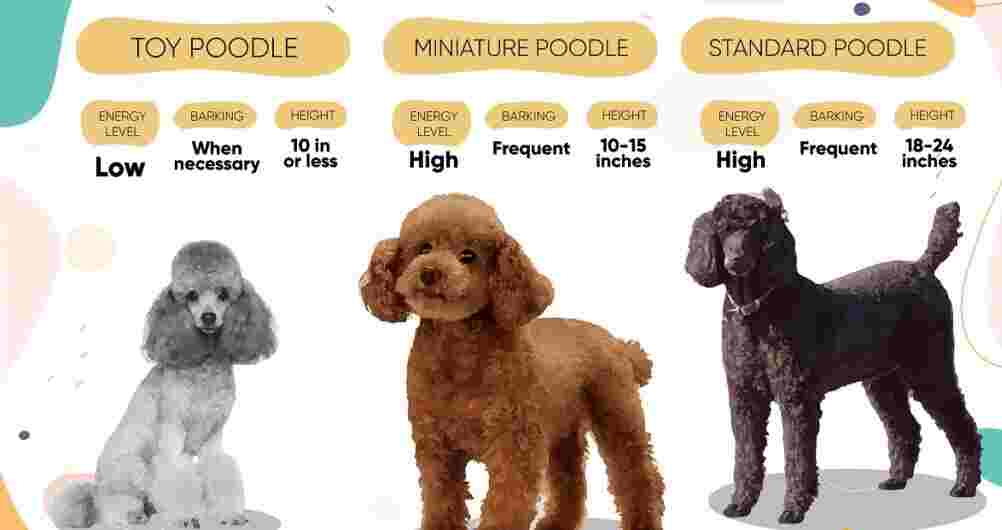Introduction
The Phantom Merle Standard Poodle is a striking and captivating variation of the Standard Poodle breed. Known for their beautiful coat patterns and charming personalities, these dogs have garnered interest among dog enthusiasts. However, their unique appearance comes with a mix of fascination and controversy, especially regarding genetics and health implications. In this comprehensive guide, we will explore the characteristics, care, training, and considerations for potential owners of Phantom Merle Standard Poodles.
Understanding the Phantom Merle Pattern
Definition of Merle
The merle pattern is characterized by a mottled or marbled coat with patches of color interspersed with lighter or diluted areas. This pattern can appear in various dog breeds, but its genetic implications are often debated. Merle can manifest in various color combinations, contributing to each dog’s unique appearance.

What is Phantom Coloring?
Phantom coloring refers to a specific pattern where a dog has a base color with contrasting markings. In the case of the Phantom Merle, the dog displays both the merle pattern and the phantom markings, which typically include tan or cream highlights on a darker base color. This combination results in a stunning visual effect that sets the Phantom Merle Standard Poodle apart from other variations.
Genetics Behind Phantom Merle
The genetics of the merle pattern are complex. The merle gene is a dominant gene that affects pigmentation in the coat, eyes, and skin. However, breeding merle dogs requires caution, as two merle parents can produce offspring with serious health issues. Understanding these genetic factors is essential for responsible breeding and ownership.
The Standard Poodle Breed
History of Standard Poodles
The Standard Poodle has a rich history dating back to the 15th century, originally bred in Germany as a water retriever. They later became popular in France, where they were refined and standardized. Their intelligence and trainability made them favorites in various dog sports and roles, including service dogs and therapy animals.
Characteristics of Standard Poodles
Standard Poodles are known for their athletic build, elegant stature, and hypoallergenic coat. They come in a variety of colors, including black, white, apricot, and more. Their intelligence is one of their most notable traits, as they rank among the most trainable dog breeds.
Importance of Breeding Standards
Maintaining breed standards is crucial for preserving the integrity of the Standard Poodle. Responsible breeders prioritize health, temperament, and appearance. However, the introduction of variations like the Phantom Merle can complicate breeding practices, making it vital for owners to choose reputable breeders who prioritize ethical practices.

Appearance of the Phantom Merle Standard Poodle
Coat Colors and Patterns
The Phantom Merle Standard Poodle boasts a striking combination of colors. The base coat can vary widely, while the merle pattern adds unique shading and marbling. The contrasting phantom markings typically appear on the eyebrows, legs, and chest, enhancing the dog’s overall beauty.
Size and Weight Specifications
As a member of the Standard Poodle category, Phantom Merle Standard Poodles typically weigh between 45 to 70 pounds and stand 15 to 24 inches tall at the shoulder. Their size and athleticism make them suitable for various activities, including agility and obedience training.
Distinctive Features of Phantom Merle
The Phantom Merle’s coat is not only visually stunning but also requires special care. Their curly, dense fur can trap dirt and debris, so regular grooming is essential to maintain a healthy coat. The merle pattern may also influence their skin health, necessitating careful monitoring for any irritations or issues.
Health Considerations
Common Health Issues in Standard Poodles
Standard Poodles are generally healthy dogs but are prone to specific conditions, including hip dysplasia, progressive retinal atrophy, and certain skin disorders. Regular veterinary check-ups and a healthy lifestyle can help mitigate these risks.
Specific Concerns for Phantom Merles
Phantom Merle Standard Poodles may face additional health concerns due to the merle gene. Potential issues include deafness, vision problems, and skin sensitivities. Responsible breeders perform genetic testing to identify potential health risks in their breeding stock, helping to reduce the likelihood of passing these issues to offspring.
Genetic Testing and Health Screenings
Genetic testing plays a crucial role in breeding practices for Phantom Merle Poodles. Tests can identify carriers of the merle gene and assess overall health. Potential owners should inquire about health screenings and genetic testing before purchasing a puppy, ensuring they are informed about any potential health risks.
Temperament and Behavior
General Temperament of Standard Poodles
Standard Poodles are known for their friendly, intelligent, and social nature. They often form strong bonds with their families and thrive on interaction. Their temperament makes them excellent companions for families, singles, and seniors alike.
Behavioral Traits of Phantom Merles
While the Phantom Merle shares the general temperament of Standard Poodles, individual personality traits can vary. Some may be more energetic or reserved, depending on their upbringing and socialization experiences. Early training and exposure to different environments are essential to develop a well-rounded personality.
Socialization Needs
Socialization is crucial for Phantom Merle Standard Poodles. Exposing them to various people, pets, and situations helps them become confident and adaptable. Puppy classes and playdates are great ways to facilitate socialization and enhance their comfort in different environments.
Training a Phantom Merle Standard Poodle
Basic Obedience Training
Training should start early to establish good habits. Basic commands such as sit, stay, and come are essential for a well-behaved pet. Poodles are eager to please, making them receptive to training.
Advanced Training Techniques
Once basic commands are mastered, owners can explore advanced training techniques. Activities like agility training, scent work, or obedience competitions can provide mental stimulation and strengthen the bond between the dog and owner.
Tips for Positive Reinforcement
Using positive reinforcement methods is vital for training success. Rewards such as treats, praise, or playtime motivate dogs and reinforce desired behaviors. Avoiding harsh training methods fosters a trusting relationship between the dog and owner.
Grooming and Care
Coat Maintenance
The Phantom Merle Standard Poodle’s coat requires regular grooming to prevent matting and keep it healthy. Brushing at least two to three times a week is recommended, with more frequent grooming needed during shedding seasons.
Bathing and Brushing Frequency
Bathing should be done every 4 to 6 weeks or as needed, depending on the dog’s activity level and coat condition. Regular brushing helps remove loose hair and debris, keeping the coat in optimal condition.
Professional Grooming vs. At-Home Care
While some owners prefer to groom their dogs at home, professional grooming services can ensure a high standard of care. Many owners opt for professional grooming every few months to maintain the coat’s shape and health.
Nutrition and Diet
Recommended Diet for Standard Poodles
A balanced diet is crucial for the health of any dog, including Phantom Merle Standard Poodles. High-quality dog food that meets their nutritional needs is essential. Look for options that contain real meat, whole grains, and essential vitamins and minerals.
Nutritional Needs for Phantom Merles
Each dog’s nutritional needs may vary based on age, size, and activity level. Consult with a veterinarian to determine the best diet for your Phantom Merle, and adjust portions as necessary to maintain a healthy weight.
Common Dietary Issues
Some dogs may develop food allergies or sensitivities, leading to skin issues or gastrointestinal upset. Be vigilant about any changes in your dog’s health or behavior related to their diet, and work with your veterinarian to address any concerns.
Living with a Phantom Merle Standard Poodle
Ideal Living Environment
Phantom Merle Standard Poodles thrive in environments where they have room to play and explore. They are adaptable but do best in homes where they have access to outdoor spaces for exercise and mental stimulation.
Exercise Requirements
Regular exercise is essential for maintaining a healthy weight and preventing boredom. Daily walks, playtime, and interactive games are vital for keeping your dog physically and mentally engaged.
Compatibility with Children and Other Pets
Phantom Merle Standard Poodles generally get along well with children and other pets, thanks to their friendly temperament. However, early socialization and positive experiences are key to ensuring harmonious relationships within the household.
The Phantom Merle Standard Poodle in Popular Culture
Representation in Media
The unique appearance of the Phantom Merle Standard Poodle has captured the interest of dog lovers and the media alike. They occasionally appear in movies, advertisements, and social media, further elevating their popularity.
Celebrity Owners and Their Pets
Many celebrities have embraced the Standard Poodle breed, showcasing their love for these intelligent and elegant dogs. While specific Phantom Merles may not be as common, the breed’s overall appeal continues to grow.
Influence on Dog Breeding Trends
The popularity of Phantom Merle Standard Poodles has sparked discussions about breeding ethics and practices. Responsible breeding practices are essential to ensure the health and well-being of these unique dogs while maintaining breed standards.
Conclusion
The Phantom Merle Standard Poodle is a stunning and unique variation that offers both beauty and companionship. With their charming personalities, intelligence, and striking appearance, they can make wonderful family pets. However, potential owners must be aware of the unique challenges associated with the merle gene, including health concerns and the importance of responsible breeding.


Pingback: what's a merle poodles : Info Overview Pictures & History
Pingback: Chocolate Merle Toy Poodles : Info Overview Origin & Pictures